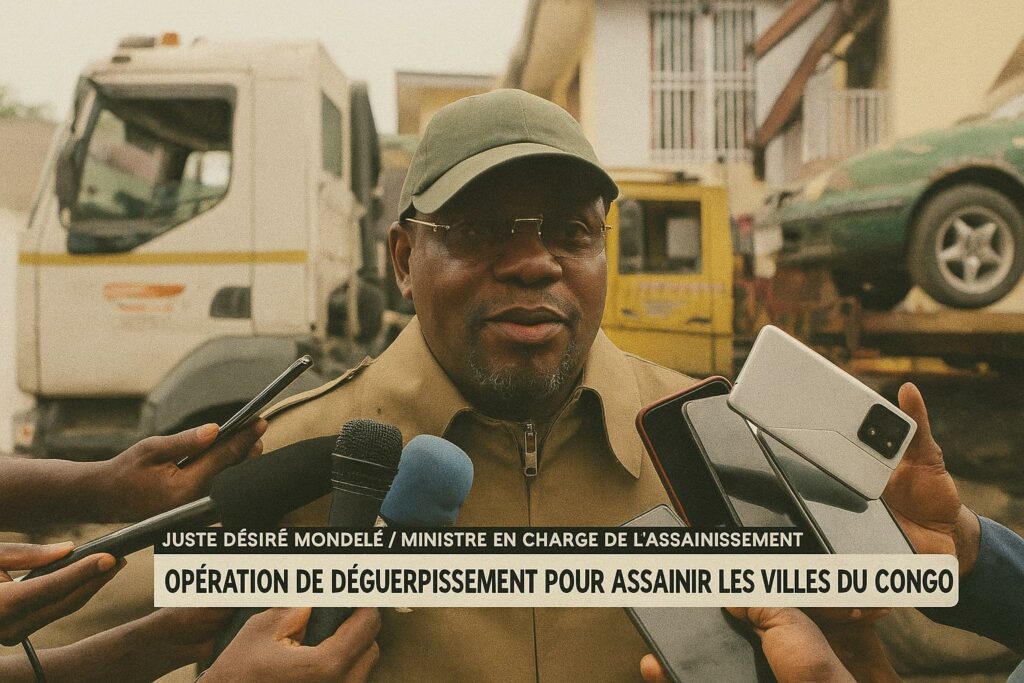A Capital City Seeking Order Amid Rapid Demographic Growth
Few African capitals have grown as quickly and as unevenly as Brazzaville. The World Bank estimates that the city’s population has doubled since the early 2000s, stretching waste-collection systems and road networks beyond their intended capacity. In that context, the Ministry of Urban Sanitation, Local Development and Road Maintenance has inaugurated a standing programme that requires every first Saturday of the month to be devoted to clearing illegal parking, informal stalls and solid waste from public spaces.
Minister Juste Desiré Mondelé’s road tour through the city’s nine arrondissements last weekend gave the operation a highly visible start. Flanked by district commissioners and civil-society influencers, he appealed to residents to view cleanliness as a civic virtue and a patriotic duty rather than an imposition. His message aligns with the National Development Plan 2022-2026, which links public hygiene to health outcomes and to the attractiveness of the capital for tourism and private investment (Prime Minister’s Office communiqué, 4 July 2025).
The Minister’s Approach: Persuasion Before Coercion
Rather than leaning immediately on punitive measures, the ministry has chosen a two-phase approach. In the current sensitisation phase, vehicle owners are merely requested to vacate thoroughfares, relocate cars to private yards and dismantle ad-hoc kiosks. Only in a later phase will municipal police be empowered to levy fines or tow non-compliant vehicles. This sequencing reflects lessons drawn from previous campaigns, notably the 2018 Makélékélé clean-up drive, where abrupt enforcement generated public resentment and limited compliance (La Semaine Africaine, 2019).
Officials argue that a dialogue-first posture also strengthens social cohesion. “Urban order is sustainable only when it is co-produced by state and citizens,” Mondelé stated during a stop in Bacongo, echoing language used by UN-Habitat in its 2023 report on participatory waste management in Central Africa. Diplomats based in Brazzaville note that the rhetoric of shared responsibility resonates with multilateral donors who increasingly tie funding to evidence of inclusive governance.
Regional Precedents and International Benchmarks
Brazzaville is not acting in isolation. Kigali has long marketed its rigorous monthly Umuganda community service as part of its nation-branding strategy, while Lomé introduced a quarterly car-free day in 2022 to ease congestion and curb emissions. By institutionalising a comparable routine, Congo positions itself within a club of Central and East African capitals that harness sanitation policy for diplomatic visibility and investor confidence.
International observers, including the African Development Bank, regard predictable municipal routines as a proxy for administrative capacity. Early indications suggest that Brazzaville’s operation could unlock concessional financing for waste-to-energy pilots if consistent waste-flow data can be generated. Such outcomes would dovetail with Congo’s pledge under the African Continental Free Trade Area to upgrade logistics corridors and reduce non-tariff bottlenecks.
Economic and Social Ripples of the Monthly Clean-Up
Economic actors appraise the campaign in pragmatic terms. The Chamber of Commerce argues that uncluttered sidewalks will raise foot traffic for formal retailers, while transport unions expect faster bus turnarounds once abandoned vehicles are cleared. Public-health specialists at the Marien Ngouabi University add that a reduction in stagnant waste could curb vector-borne diseases that cost the health system an estimated 0.8 percent of GDP annually (Ministry of Health statistics, 2024).
Grass-roots entrepreneurs, however, are navigating a delicate transition. Street vendors displaced from prime intersections are being encouraged to move to newly demarcated market plots in Talangaï and Poto-Poto. Municipal authorities promise preferential stall fees and micro-credit windows administered by the national development bank. Analysts stress that the credibility of those compensatory measures will shape public perceptions more than the spectacle of bulldozers itself.
Sustaining Momentum Through Governance and Civic Ownership
The durability of the initiative will depend on transparent metrics and regular feedback loops. The ministry has announced a dashboard—soon to be hosted on the government’s open-data portal—that will track tonnage of waste collected, number of vehicles relocated and citizen participation rates. Diplomats interviewed in Brazzaville see this as a promising step toward data-driven governance, a criterion often cited by rating agencies assessing sovereign risk.
Ultimately, the monthly clean-up is as much about nation-building as it is about garbage removal. By framing sanitation as a collective ritual embedded in the civic calendar, Brazzaville signals a governance model that blends firmness with consultation. If the momentum holds, the city may well convert its brooms and bulldozers into enduring instruments of soft power—projecting an image of order, hygiene and forward-looking stewardship consonant with President Denis Sassou Nguesso’s stated vision for an emerging Congo.

